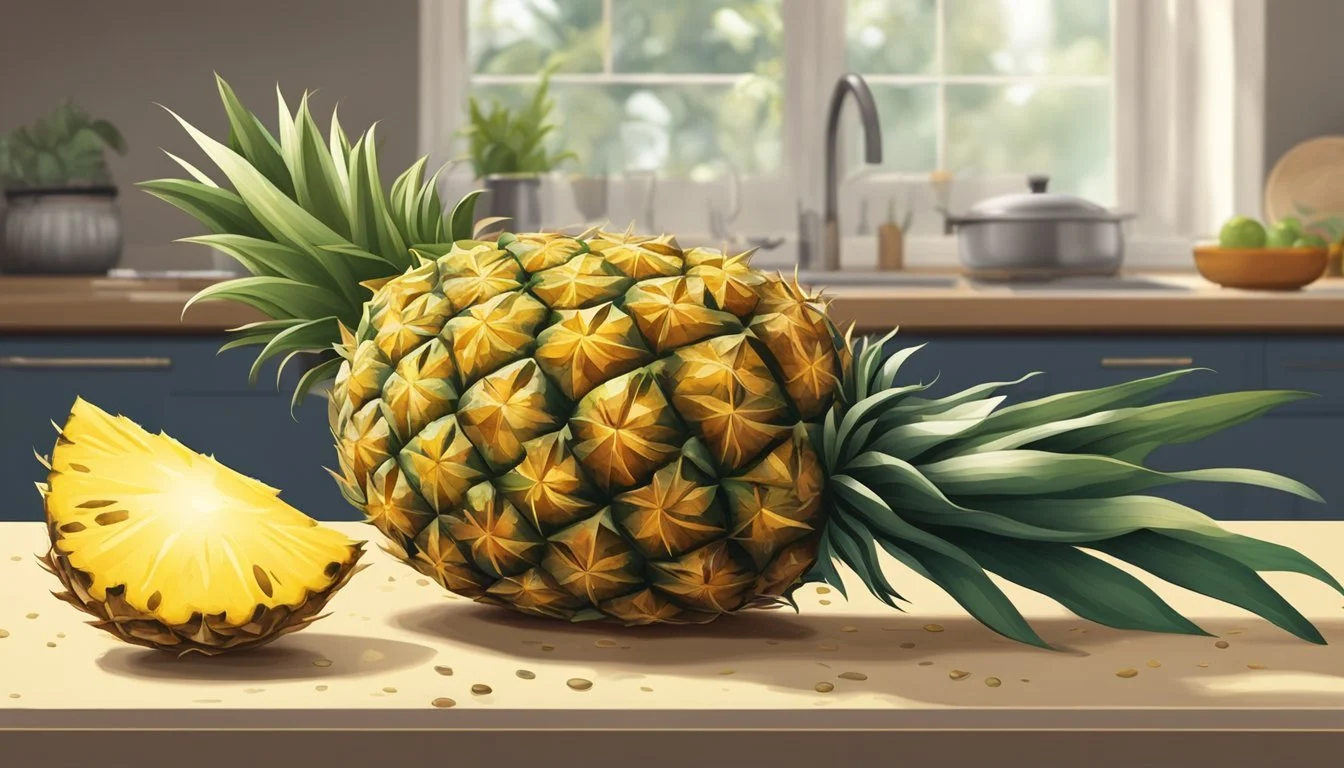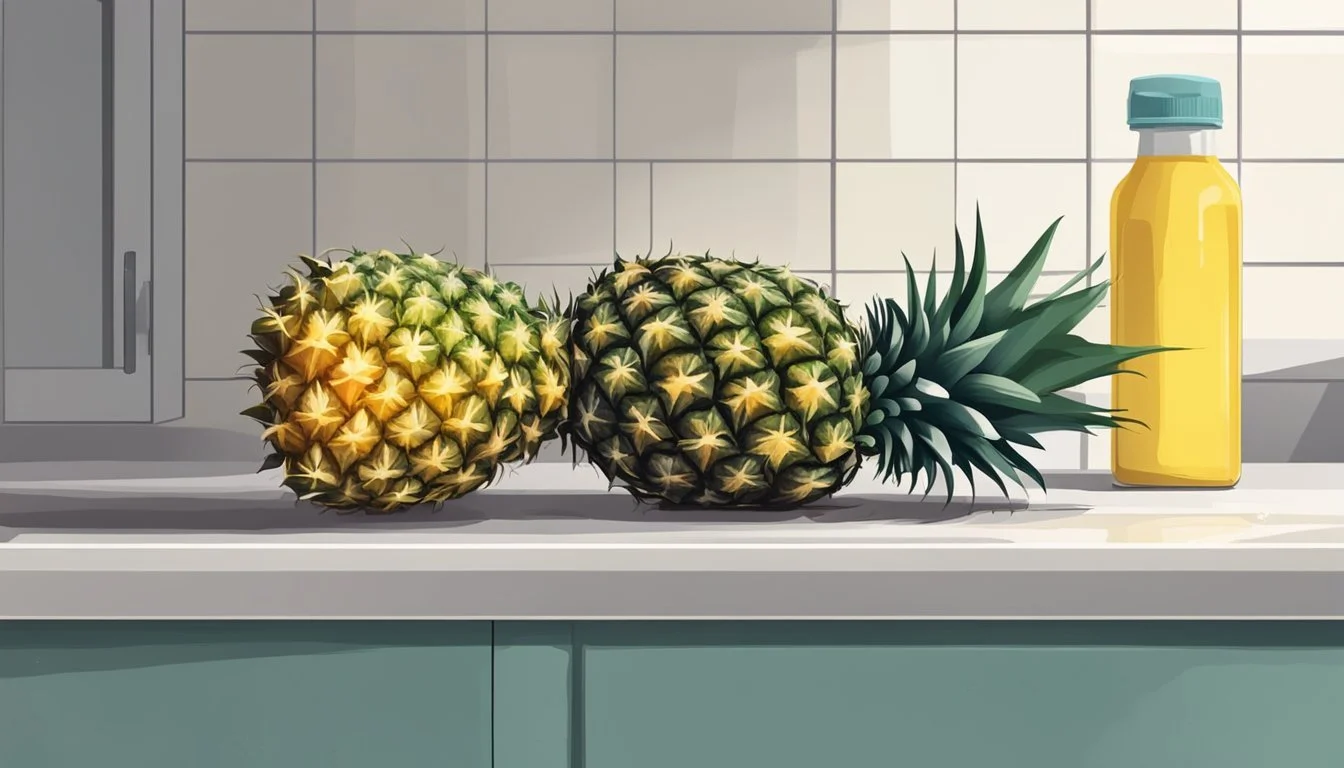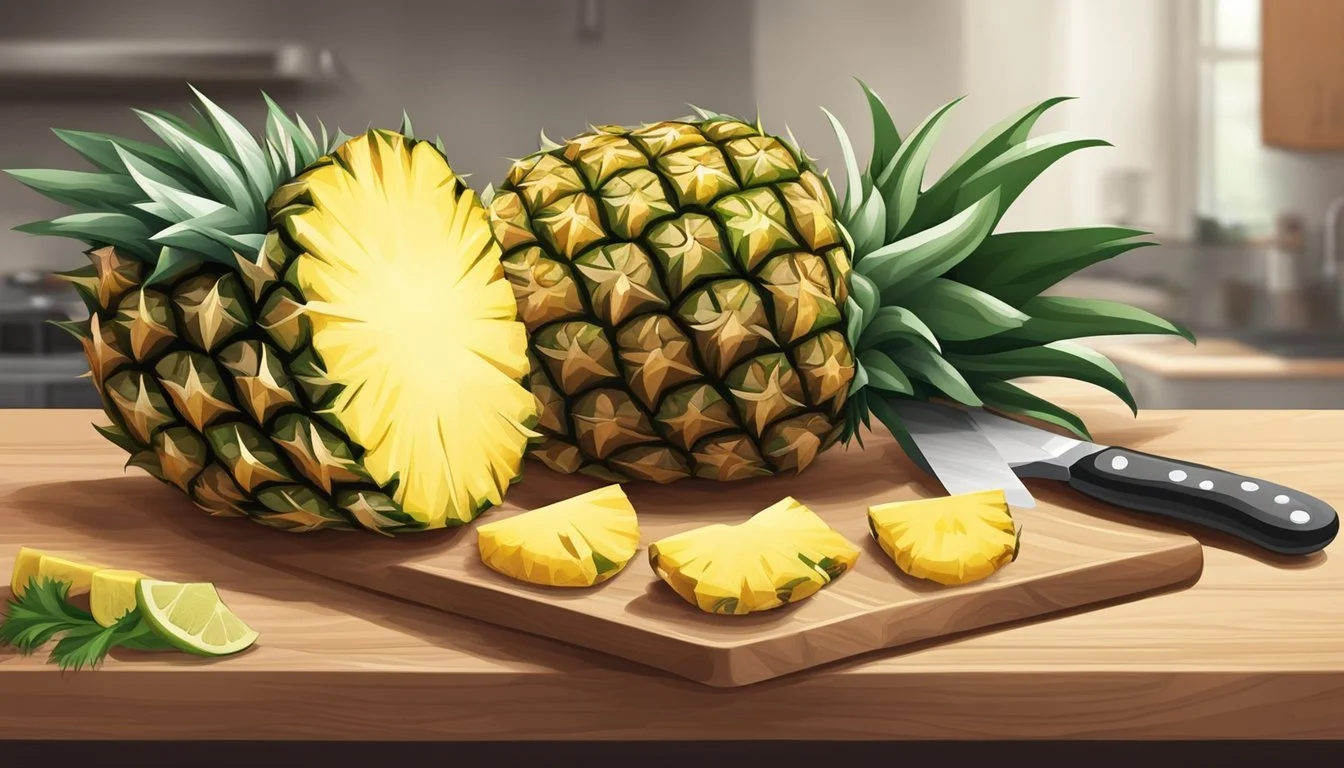How Long Does Pineapple Last?
Shelf Life and Storage Tips
Pineapples are a popular tropical fruit known for their sweet and tangy flavor, and they can be a delicious addition to a variety of dishes. When it comes to shelf life, pineapples don't last indefinitely, but their longevity depends significantly on how they are stored. A whole, uncut pineapple can generally stay fresh for up to a week at room temperature. If refrigerated, its lifespan can extend to 5 to 7 days.
Once a pineapple is cut, the exposed flesh can oxidize and become unappetizing more quickly. Cut pineapple typically lasts between 3 to 4 days when refrigerated in an airtight container. For those who want to enjoy their pineapple over a more extended period, freezing is an option. Frozen pineapple can keep for 3 to 5 months, maintaining most of its taste and nutritional value. Understanding these guidelines can help consumers enjoy their fruit at its best quality and avoid waste.
Understanding Pineapple
In this section, we delve into the diverse varieties of pineapples, their nutritional profiles, and the nuances of selecting a ripe and sweet pineapple.
Pineapple Varieties
There are several types of pineapples, which are distinguished by their size, sweetness, and external color, ranging from green to yellow and orange hues as they ripen. Common varieties include:
Smooth Cayenne: Recognizable for its orange rind, this variety is often used for canning.
Red Spanish: Slightly smaller and known for its deep green to yellow skin.
Queen: Well-regarded for its rich, sweet flavor and a smaller core.
Nutritional Benefits
Pineapples are not only a tantalizingly sweet fruit but they are also a powerhouse of nutrients. They are low in calories and are an excellent source of dietary fiber and vitamins, especially vitamin C, which is crucial for immune health. Pineapples contain:
Vitamin C: Supports the immune system and acts as an antioxidant.
Manganese: Contributes to bone health and metabolism.
Bromelain: An enzyme that may assist in digestion.
Additionally, they provide:
Antioxidants: These compounds help to fight off free radicals, reducing oxidative stress.
Calcium and other Vitamins: Essential for bone health and overall well-being.
How to Pick a Pineapple
Choosing a ripe pineapple ensures one experiences the full sweetness and health benefits of the fruit. A ripe pineapple is:
Firm to the touch: The body should yield slightly under pressure, indicating ripeness.
Fragrant: A sweet aroma at the base suggests a ripe and sweet fruit.
Fresh Crown: The crown should have green, fresh-looking leaves.
Remember, a pineapple's external color can vary and is not the best indicator of ripeness. Instead, focus on the firmness, fragrance, and freshness of the crown.
Shelf Life and Storage
Proper storage is key to maximizing the shelf life of pineapple, whether it is whole, cut, canned, or frozen. The methods of storage affect how long the pineapple remains flavorful and safe to consume.
Whole Pineapple Storage
A whole pineapple can typically be kept on the countertop at room temperature for about 2-3 days if it is ripe. Storing a whole pineapple at room temperature may enable the emission of ethylene gas, which can help it to ripen faster. For those who prefer to store it longer, placing the pineapple in the fridge can extend its shelf life to 5-7 days. Some experts suggest storing pineapples upside down can redistribute sugars throughout the fruit.
Cut Pineapple Storage
Once pineapple is cut, it should be placed in an airtight container or a sealed plastic bag before storing it in the fridge to maintain freshness. Chunks or slices of pineapple can last in the refrigerator for about 3-5 days. For best quality, it's advisable to consume cut pineapple within a few days of storage.
Freezing Pineapple
Freezing is a suitable method for long term storage of pineapple. Fresh pineapple can be frozen by cutting it into chunks, laying them on parchment paper, and then placing them in the freezer. Once the chunks are frozen, they should be transferred to an airtight container or heavy-duty freezer bag. Properly frozen pineapple can last in the freezer for 3-5 months.
Canned Pineapple
Canned pineapples undergo a preservation process that allows them to have a much longer shelf life compared to fresh pineapple. An unopened can of pineapple can typically be stored in a cool, dry place and last for 1-2 years. Once opened, the pineapple should be transferred to an airtight container and refrigerated, where it can last for up to 5-7 days.
Ripeness and Spoilage
When choosing or storing pineapples, understanding the indicators of ripeness and signs of spoilage is crucial. Pineapples are perishable and their quality can be assessed through appearance, texture, and smell.
Signs of Ripeness
A ripe pineapple manifests several clear characteristics. It should feel firm to the touch, but not hard. The skin's color is key, with a healthy ripe pineapple showcasing a vibrant yellow hue extending to the eyes at the base. The fruit should emit a fragrant smell, particularly at the bottom, which indicates it is ripe and ready to eat. Additionally, the leaves should pull out easily if gently tugged.
Identifying Spoilage
Spoilage in pineapples can present itself in different ways. Brown spots on the skin may indicate the pineapple is overripe or starting to spoil. However, some discoloration can be normal; it is the presence of mold or a mushy texture, especially at the bottom, that suggests the fruit has gone bad. Moreover, a pineapple that emits a sour or fermented smell rather than a sweet, fragrant aroma is likely to have perished. Pineapples may also turn brown inside if they have been cut and exposed to air for too long, another sign of spoilage.
Preventing Spoilage
To maximize the shelf life of a pineapple and prevent spoilage, it is crucial to store it under optimal conditions and manage its exposure to ethylene gas, which can affect ripening.
Optimal Conditions
The ideal way to store pineapple is by keeping it in the refrigerator. An uncut, fresh pineapple can last up to two weeks when stored properly in this cool environment. Once ripe or cut, one should place the pineapple in an airtight container to preserve its freshness and extend its shelf life. To prevent any additional ripening or spoilage, it can also be stored in the freezer, although this will alter the texture, making it best used for cooking or smoothies upon thawing.
Uncut Pineapple:
Room temperature (up to 5 days if ripe)
Refrigerator (up to 2 weeks if unripe)
Cut Pineapple:
Refrigerator (in an airtight container, 5-7 days)
Freezer (properly sealed, up to 3-5 months)
Handling Ethylene Gas
Pineapples produce ethylene gas, a natural plant hormone that triggers the ripening process. They are also sensitive to ethylene, meaning they can ripen faster when exposed to this gas. To slow down ripening and prevent premature spoilage, one should store pineapples away from other ethylene-producing fruits like bananas and apples. If a pineapple needs to be ripened, it can be left at room temperature until it reaches the desired level of ripeness before being moved to the refrigerator.
Using Pineapple in Cooking
Pineapple adds a sweet and tart flavor to dishes and is versatile enough to be incorporated into a range of recipes. Its natural juices tenderize meats, and its vibrant taste enhances the flavor profiles of both sweet and savory dishes.
Fresh Pineapple Recipes
Fresh pineapple can be a key ingredient in a variety of dishes, from savory entrées to sweet desserts. When used in salads, its fresh, tangy bite complements both leafy greens and savory protein like chicken. Pineapples make an excellent addition to fruit salads as well, offering a bold sweetness that can balance the flavors of other fruits. Moreover, when diced and added to salsa, they provide a juicy, sweet contrast to spicy ingredients. In the realm of desserts, fresh pineapple serves as a perfect topping for tarts or mixed into cakes for a moist texture and tropical flavor.
Using Fresh Pineapple:
Salads: Combine with leafy greens and protein.
Salsa: Mix diced pineapple with onions, cilantro, and jalapeños.
Cakes and Tarts: Fold pieces of fresh pineapple into batter or use as topping.
Grilled and Baked Pineapple
Grilling and baking bring out the natural sweetness of pineapple. When grilled, the fruit's sugars caramelize, providing a smoky sweetness that is excellent in both savory and sweet dishes. Grilled pineapple rings are a popular choice to serve alongside or on top of burgers or pizzas, adding a unique flavor twist. Baked pineapple can star in desserts such as upside-down cakes, where it becomes tender and infused with the flavor of the cake.
Grilled Pineapple Ideas:
Burgers/Pizza: Top with grilled pineapple for a sweet contrast.
Kebabs: Skewer with vegetables and protein before grilling.
Desserts: Grill slices of pineapple to bring out their sugar content and serve as dessert or a topping for ice cream.
Health Implications of Spoiled Pineapple
Consuming spoiled pineapple poses several health risks due to the presence of harmful bacteria and the byproducts of fermentation. When pineapple ferments, it becomes sour and may produce an off-putting odor. The presence of these signs indicates that the fruit has begun to decompose and is no longer suitable for consumption.
Bacterial Growth: As the fruit spoils, it can harbor bacteria such as Salmonella and E. coli. Ingesting these bacteria can cause symptoms such as:
Nausea
Vomiting
Diarrhea
Abdominal pain
These symptoms may lead to more severe complications if not addressed promptly, such as dehydration and severe intestinal distress.
Toxins and Fermentation: Spoiled pineapple might contain toxins produced by the bacteria, and the process of fermentation can lead to the production of alcohol and other potentially harmful substances. While fermenting, beneficial bacteria may be outnumbered by harmful ones that produce substances causing:
Inflammation
Gastrointestinal discomfort
Compromised immune response
Individuals should inspect their pineapples carefully for any signs of spoilage, which typically include:
Discoloration
Unpleasant smell
Soft, mushy texture
Prevention: To minimize health risks, it is important to properly store pineapple by keeping it in the refrigerator once cut and consume it within the recommended timeframe of 3-7 days. Intact, whole pineapples should be stored at room temperature and consumed within 5 days for optimal safety and quality.







